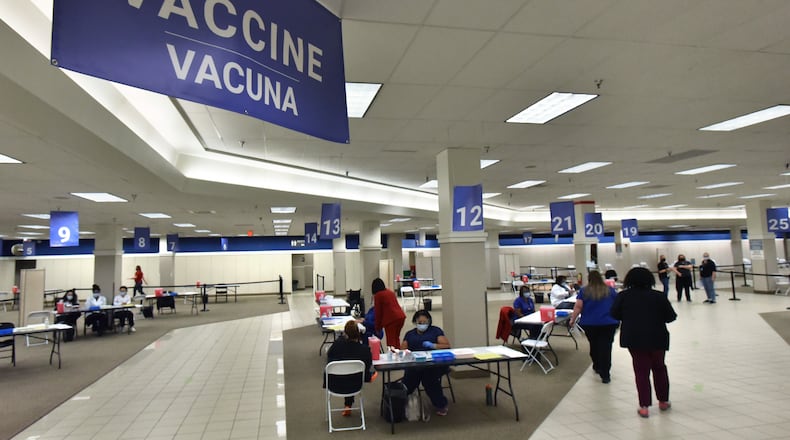Schools across Georgia are prepping for mass vaccination of their staff as soon as Gov. Brian Kemp expands eligibility to them.
Many want to use their own nurses to administer the shots of COVID-19 vaccine, often with the help of local health departments and pharmacies, though not all have a nurse on staff.
Marietta, a city school district of fewer than 9,000 students, plans to tap local pharmacy and ambulance services to augment its nurses at a clinic at the high school, with central office staff steering traffic. Forsyth County, a district of 51,000, will use the same church where staff who are already eligible by age have been dosed. Fulton County, with 90,000 students, will send about 30 nurses, including some hired just for the event, to Mercedes-Benz Stadium, where the county health department has secured space for them. Gwinnett County, Georgia’s largest district with about a tenth of the state’s more than 1.7 million students, plans to send staff to the county’s new mass vaccination site at the old Sears building at the Gwinnett Place Mall.
Gwinnett has about 25,000 staffers at 139 schools.
”This will not be a quick process,” Gwinnett schools spokeswoman Sloan Roach said. The district is encouraging employees to get vaccinated at their own doctor’s office if they can.
Credit: HYOSUB SHIN / AJC
Credit: HYOSUB SHIN / AJC
Kemp is expected to announce this week when teachers will finally get their turn. Georgia is behind most other states, such as Virginia, where Fairfax County Public Schools, about the size of Gwinnett schools, began vaccinations Jan. 16 and has already moved on to second doses. About 90% of that district’s 25,000 staffers chose to vaccinate, far more than officials anticipated given the hesitancy in the general populace reflected in national polls.
“Our staff really wanted those shots,” said Marty Smith, the COO for Fairfax schools.
Once Kemp opens vaccines to teachers, the state’s 2,300 schools will have a logistical challenge administering doses to what the governor’s office has said is an employee population approaching half a million.
Smith advised that school districts create a priority list for their staff vaccinations so that everyone isn’t hitting the registration system at the same time and crashing it, as happened in Fairfax.
Georgia districts have had some experience already because many have set up vaccinations for their fraction of employees who qualified due to age. In Georgia, those aged 65 and up have been eligible since Jan. 11.
Ron Wade, the chief talent officer for Fulton schools, said his district built its own in-house registration system and tested it with 600 older employees. The district is planning two 6-day sessions — one for each round of doses — to inoculate about 10 times as many employees this time.
There are 180 locally controlled school districts and potentially that many vaccination plans. The Georgia Department of Education empaneled 13 superintendents from around the state last month to develop planning templates, but the committee has yet to meet due to scheduling issues.
“That face to face just hasn’t happened yet,” said Kristie Brooks, the Chattahoochee County School District superintendent and one of the panelists. As with preparations for last fall, she said, local school leaders must plan for themselves, especially since there is so much variation between the districts.
Chattahoochee County, with fewer than a thousand students in southwest Georgia, has just two school properties, one for the elementary school and another shared by the middle and high schools. A private medical provider has space at each and will vaccinate the staff, she said.
Only 40% of Brooks’ staff is willing to get vaccinated right away. In Gwinnett, about half the staff said in a district survey that they wanted to be inoculated. In Cherokee County, one of the first districts in the state — and the nation — to open its doors last fall, about 50% of survey respondents said they wanted to get inoculated, according to a spokeswoman, who noted that more than a quarter of the staff didn’t respond to the survey.
Credit: Ben Gray
Credit: Ben Gray
That’s been a common problem in data collected by the state, which indicates that just less than half of school staffers want to be vaccinated: Only 139 school districts submitted complete survey results, and the calculations typically are based on total staff in each district rather than just those responding to the local surveys.
The state count says maybe half of Marietta employees want to get vaccinated, but Superintendent Grant Rivera noted that only 744 of his 1,400 educators responded to his survey. He said 554 of those who did respond — 75% — want to get vaccinated.
Rivera allowed Centers for Disease Control and Prevention researchers to monitor outbreaks at his schools, and their new report, out this week, highlights the value of vaccinating teachers: most infections in the schools started with adults. Rivera has mandated masks, but teachers let their guard down when eating and talking together, he said, adding that he’s now urging them to eat alone or outside if they must be together and that he’s requiring staff meetings to be held online.
“And if we can get them vaccinated,” he said, “our children and our colleagues will be safer.”
About the Author
Keep Reading
The Latest
Featured


